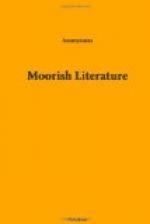’Tis love that from Granada’s
home has sent him thus to rove,
And for the lovely Zaida he languishes
with love—
The loveliest face that by God’s
grace the sun e’er shone above.
From court and mart he lives apart, such
is the King’s desire;
Yet the King’s friend Alfaqui is
the fair maiden’s sire.
Friend of the King, the throne’s
support, a monarch’s son is he,
And he has sworn that never Moor his daughter’s
spouse shall be.
He has no ease till the monarch sees his
daughter’s loveliness.
But she has clasped brave Zaide’s
hand, and smiled to his caress,
And said that to be his alone is her sole
happiness.
And after many journeys wide, wearied
of banishment,
He sees the lofty tower in which his Moorish
maid is pent.
ZAIDA’S LAMENT
Now the hoarse trumpets of the morn were
driving sleep away;
They sounded as the fleeting night gave
truce unto the day.
The hubbub of the busy crowd ceased at
that dulcet sound,
In which one moment high and low peace
and refreshment found.
The hoot of the nocturnal owl alone the
silence broke,
While from the distance could be heard
the din of waking folk;
And, in the midst of silence, came the
sound as Zaida wept,
For all night long in fear of death she
waked while others slept.
And as she sighed, she sang aloud a melancholy
strain;
“And who would wish to die,”
she said, “though death be free from pain?”
For evil tongues, who thought to win her
favor with a lie,
Had told her that the bold Gazul ordained
that she should die;
And so she donned a Moor’s attire,
and put her own away,
And on the stroke of midnight from Xerez
took her way.
And
as she sighed, she sang aloud a melancholy strain;
“And
who would wish to die,” she said, “though
death be free from
pain?”
She rode a nimble palfrey and scarce could
great Gazul
Excel the ardent spirit with which her
heart was full.
Yet at every step her palfrey took, she
turned her head for fear,
To see if following on her track some
enemy were near.
And
as she went, she sang aloud a melancholy strain;
“And
who would wish to die,” she said, “though
death be free from
pain?”
To shun suspicion’s eye, at last
she left the king’s highway,
And took the journey toward Seville that
thro’ a bypath lay;
With loosened rein her gallant steed right
swiftly did she ride,
Yet to her fear he did appear like a rock
on the rough wayside.
And
as she went, she sang aloud a melancholy strain;
“And
who would wish to die,” she said, “though
death be free from
pain?”




